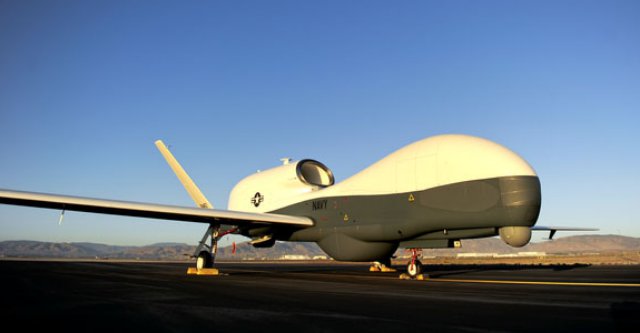 Ahead of its first flight, the U.S. Navy’s Northrop Grumman MQ-4C Triton has performed high-speed taxi tests at Northrop’s Palmdale, California, facility after the resolution of issues that delayed flight testing and pushed back the start of production by a year.
Ahead of its first flight, the U.S. Navy’s Northrop Grumman MQ-4C Triton has performed high-speed taxi tests at Northrop’s Palmdale, California, facility after the resolution of issues that delayed flight testing and pushed back the start of production by a year.
A mass-balance issue on the V-tail ruddervators that affected control authority has been resolved, says Tom Vice, President of Northrop Grumman Aerospace Systems.
A second concern involved software for the aircraft’s vehicle management system, which is different from that in the Global Hawk. Issues discovered during laboratory testing have been addressed, he says.
“The aircraft has been through high-speed taxi tests and first flight will be in the near future,” Vice says.
The U.S. Navy plans to buy 68 MQ-4Cs to operate as adjuncts to its 117 Boeing P-8A Poseidon maritime patrol aircraft, providing long-endurance intelligence, surveillance and reconnaissance (ISR).
Australia intends to buy P-8s to replace its Lockheed P-3C Orions, and says the letter of request for detailed information will allow it to consider the MQ-4C for its AIR 7000 Phase 1B programme to acquire a high-altitude, long-endurance UAS for maritime patrol and other surveillance missions.
Northrop, meanwhile, is facing a challenge in keeping the Global Hawk production line open. The U.S. Air Force intends to cap procurement at three Block 20s with communications-gateway payloads, 18 multi-sensor Block 30s and 11 radar-equipped Block 40s for ground surveillance.
Of these, the remaining two Block 30s and three Block 40s are in production. The Air Force is resisting congressional pressure to build another three Block 30s to complete the planned procurement of 21, arguing it intends to retire the aircraft after 2014 in favour of keeping the Lockheed U-2 in service.
For Northrop, the final three Air Force Block 30s would bridge a potential gap until production of the MQ-4C begins in fiscal 2015. The company also wants to keep the Block 30 line open for international customers, beginning with the sale of four aircraft to South Korea now working its way through U.S. approvals.
Germany on May 15 announced it will not proceed with procurement of four Block 40-based Euro Hawks for electronic intelligence-gathering, citing issues with operating the UAV in civil airspace. NATO still plans to buy five Block 40s. Japan and Canada have expressed interest in Block 30s, and India in MQ-4Cs.
Source: Aviation Week

Successful First Flight was completed on 5/22/13 at 0830 am at Palmdale Calif. !